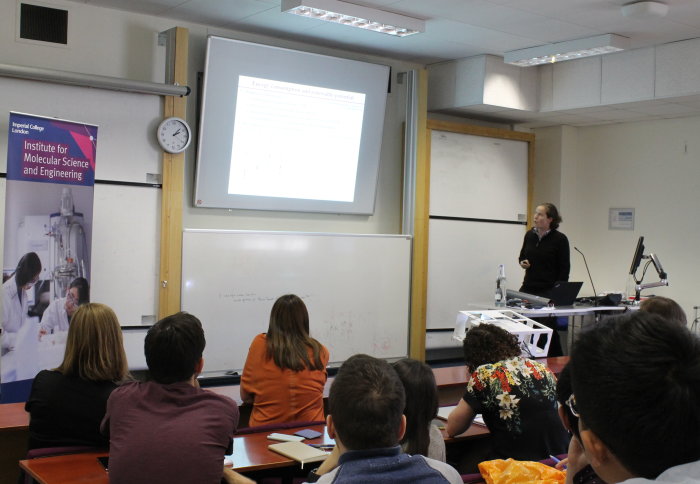Rising star in solar fuel research

The Institute for Molecular Science and Engineering rounded off this academic year with a Highlight Seminar by Professor Sophia Haussener from EPFL.
Raising the bar
In the lead up to this weekend’s International Women in Engineering Day (INWED), Professor Haussener’s talk was a fitting example of the outstanding contributions that female researchers make to engineering, and to all STEM fields.

INWED – occurring every year on 23 June – was launched in 2014 as an awareness campaign to raise the profile of women in engineering. The campaign also focuses attention on career opportunities available to girls in the engineering sector, and celebrates the achievements of women engineers around the world – with this year’s theme being “raising the bar”.
With an undergraduate degree and PhD in mechanical engineering from ETH Zurich, postdoctoral experience at the USA’s Lawrence Berkeley National Laboratory, and now head the Laboratory of Renewable Energy Science and Engineering at EPFL, Professor Haussener is exactly the kind of role model INWED seeks to promote.
The global energy problem
Calculations show that harvesting solar energy is the most promising route to meeting the world’s massive energy demands in a sustainable manner. Professor Sophia Haussener EPFL
The aim of the Institute for Molecular Science and Engineering (IMSE) Highlight Seminar Series is to bring world-leading researchers from around the world to Imperial, and to provide the stimulus for lively discussions around important global challenges in which molecular science and engineering can make a valuable contribution.
Professor Haussener’s seminar – Modelling, experimentation and scaling of solar fuel processing devices – perfectly illustrated the way that an integrated and transdisciplinary research approach can be used to make inroads into pressing worldwide problems.

Indeed, Professor Haussener began by explaining the overriding issue she is trying to address with her work. That is, the world’s current energy demand is about 17 TW, of which only 13% comes from renewable sources. Even with the predicted increase in the supply of renewable energy (estimated at 10–20 TW), there is a serious deficit in the amount of available sustainable energy.
Flexible, scalable and cost-effective solar fuels
Although solar radiation is the most abundant source of energy we have available on Earth, its delivery is distributed and intermittent. To store and use solar energy, it must therefore be collected and converted to a practical fuel (e.g., hydrogen or carbohydrates).
Through various theoretical and experimental strands of research, Professor Haussener aims to find flexible, scalable, cost-effective and practical ways to convert solar energy to chemical fuels.

For example, Professor Haussener described her group’s work on modelling the functionality of photoelectrochemical devices, and how their model framework can be used to guide the design and operation– in terms of efficiency, cost, robustness, scalability and practicability – of these devices.
Professor Haussener also described the high-flux solar simulator in her laboratory at EPFL that is used to characterize, test the feasibility of, and optimise solar storage processes and devices.
Summer break
IMSE’s calendar of events, including the Highlight Seminar Series, will resume in the autumn. Follow the Institute on Twitter or LinkedIn, or sign up to their mailing list to hear about all their latest news and opportunities.
Article text (excluding photos or graphics) © Imperial College London.
Photos and graphics subject to third party copyright used with permission or © Imperial College London.
Reporter
Dr Shoshana Z Weider
Faculty of Engineering